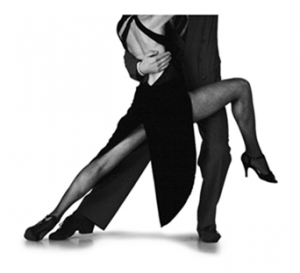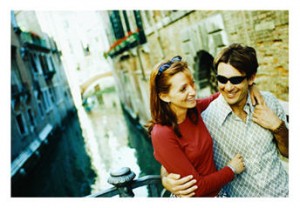Surely, we would like to think not. And those of us who have read of the relationship between David Bowie and Iman — stories of the iconic rock star’s life much in the news after his passing — would seem to have an example of a successful and romantic marriage.
So what about the rest of us?
What about those for whom connubial bliss went from sizzle to fizzle in year 2 or 3, or after the second child or the second mortgage? What about those who made it reasonably well to 10 years, but by 15 they were simply coasting companionably, the romance… long gone?
And then of course there are those who never married, or never remarried when their unions ended. A series of relationships may offer excitement and tenderness, but what if those that flowered for a time couldn’t be sustained?
Is it unreasonable in today’s crazy, pressurized world to believe that romance matters? Is the problem a shortage of time? Is the challenge more complicated?
Sex? We can find that.
Friends with benefits? That, too.
Romance… Wherefore Art Thou?
But romance? What is it, exactly? Why does it seem so elusive?
Are our expectations skewed? Is it unrealistic to anticipate romantic gestures in our harried, crazy stressful lives when we have so many other things to worry about? Is it nuts to hope that a hubby of 10 years or twenty might still be able to spark that special smile?
Have men discarded the notion that women want romance — any of us? Or do they no longer believe that romance is required?
 Is that question gender-biased and unfair? Don’t men desire romance, too? Aren’t some women, myself included, just as apt to be so preoccupied with getting through the day as to forget the power of a romantic moment?
Is that question gender-biased and unfair? Don’t men desire romance, too? Aren’t some women, myself included, just as apt to be so preoccupied with getting through the day as to forget the power of a romantic moment?
Romance… Without Love
What does “romance” mean to you? Is love always involved? Do you imagine visions of yourself stepping into candlelit scenes as the champagne flows? Are you starring in your own show, strolling hand-in-hand along the beach at sunset? Or would you prefer a Venetian canal?
Maybe romance is as traditional (and deceptive?) as roses delivered at the door, or better still, a perfectly timed kind word.
- Is romance an indication of love or that it’s brewing?
- Do you assume it will lead to marriage? Does it bring us closer, or is it a smoke screen? A false god?
- Can it be enjoyed without assumptions – a simmering sign of affection that needs no Cupid’s arrow in the mix?
Defining Romance
 Must declarations of amour be accompanied by the grand gesture? Wouldn’t a deep dip and a turn around the kitchen do?
Must declarations of amour be accompanied by the grand gesture? Wouldn’t a deep dip and a turn around the kitchen do?
As I am likely to be thrilled with both the memorable gesture and the spontaneous spin, surely ‘everyday’ romance is modestly achievable.
Perhaps we simply need a more flexible interpretation of its definition.
According to Random House Dictionary (on Dictionary.com), romantic means:
. . . displaying or expressing love or strong affection; ardent, passionate, fervent; fanciful, impractical, unrealistic (as in ideas); characterized by a preoccupation with love or by the idealizing of love or one’s beloved.
Now there’s conflicting information for you. Love? Okay. And idealism, along with the glossing over of reality that is is implied. Passion? We get it.
And somehow, we need to accommodate the ‘impractical.’
Really?
Love Without Romance
How many of us have loved – or still do – men and women who don’t have a romantic bone in their bodies? They have good hearts, a clear understanding of what it is to partner with another person, and they remain loyal, caring, and even passionate in a relationship.
We love them for who we see (and wish to see); we love them for how they are with us (on good days and bad); we love them with or without romance – though we wouldn’t mind a tiny display of that something special, even now and then.
 Can love without romance work?
Can love without romance work?
We know it can.
So why do we miss the romance when it’s gone? Why do we long for it, if we never had it?
Sex – and Then What?
Have you ever had a steamy relationship that had little to do with love, and everything to do with adventure and eroticism? What about an affair that involves human connection when you needed it, or simply good sex?
Romance?
We might enjoy its floral abundance, its gifts galore, its stream of sparkling cards on all the appropriate occasions. Still, we know that relationships can flourish without it – and some would say, especially if there’s good sex.
- If it’s sex without love, are we less likely to crave the romantic?
- If passion can stand alone, does it require other gestures?
- If we have great sex with a little romance thrown in, do we mistake it for love?
- Does it add to our confusion between sex and lovemaking?
Must Marriage Mean the End of Romance?
 For more than a decade, I rose early, brewed my coffee, began my work day, and dealt with my children. If my husband was in town, I prepared his coffee just before the hour he preferred to rise. I added milk the way he liked it, set the cup by his side of the bed, then woke him, gently.
For more than a decade, I rose early, brewed my coffee, began my work day, and dealt with my children. If my husband was in town, I prepared his coffee just before the hour he preferred to rise. I added milk the way he liked it, set the cup by his side of the bed, then woke him, gently.
I recall my older son making me a cup of coffee in the morning a few times. He was eight or nine. But not my husband. Never my husband.
Is routine the enemy of romance? Laziness? Boredom? Is it lack of ‘training?’ An absence of attentiveness?
Is marriage doomed to shed its romantic nooks and crannies as partnership becomes about the marital unit, as love changes shape, as priorities shift?
What Do You Consider Romantic?
When love is long term, perhaps we settle into rhythms that we cease to question. This can be as true of the long term relationship as marriage, which I have discovered in recent years.
If you’re fortunate, flowers or love notes give way to extra sleep on the weekend because the baby’s been keeping you up. To taking the kids out so you can have an hour of quiet. To surprising you with a walk together through your favorite neighborhood. To bringing home pizza so there’s no need to cook. To taking on more of the domestic chores so the last minute work project can be completed.
So there is energy – and time – for making love, not having sex.
Like any woman, I may be dazzled by flowers arriving unexpectedly, but I don’t need them. What I do need are signs that I am appreciated, cherished. Treasured even. And seen for who I am.
Real Life, Real Romance
It’s easy to be romantically inclined when you’re on vacation, removed from the stresses of daily duties.
But in our real lives, our everyday mess and chaos, is it unrealistic to think that romance is around the next corner? Or in some unanticipated act from your spouse of twenty years?
I’ve known passion without romance (it’s certainly fulfilling), romance without passion (also viable), and something like marriage that was lacking in both departments, foreshadowing a lifestyle missing its music.
Still, there was love, and there were certainly good moments. Elements other than an absence of romance brought about its inevitable end.
Friendship? Respect? Values?
 When it comes to love, three little words — without action to stand them up — don’t do the trick.
When it comes to love, three little words — without action to stand them up — don’t do the trick.
When it comes to love, I believe that friendship, respect, character and common values provide the foundation to sustain the partnership. And yes, I realize that words like ‘character’ and ‘values’ fall trippingly off the tongue, but they’re damn difficult to define, and then to live up to.
But without romance and affection, if not passion?
For some, as long as the relationship is respectful and caring, all will be fine. For others, it’s simply not enough.
If we’ve lost the romance but the foundations remain intact, what would it take to put a little bit of it back?
You May Also Enjoy

Since humans have been on this earth there have been 24 hours in a day. What we fill those hours with is up to us. The “pressure” of everyday life is self made and it can be regulated. I refuse to feel guilty if I leave work early and take her to the theater to watch a Marx Brothers movie. That’s romantic!
Marx Brothers. Classic. Sounds pretty romantic to me, too, Larry.
“What I do need are signs that I am appreciated, cherished. Treasured even. And seen for who I am.”- To me, this captures the essence of romance – which may look different for each individual. However, it is the individuality of it that gives it meaning.
Just last night at bedtime, my 7-year-old son asked to explain “flirting.” I suggested in was a subtle way of asking for attention and gave him some age-appropriate examples. He got it! “When you want to be noticed by someone you think is special,” he said. Spot-on, in my opinion, though the methods vary to extremes. So then, romance may be noticing and appreciating in a way that is valued. Sometimes it is an act of service, sometimes an act of indulgence.
I have so many more thoughts on this but not the time to write them. I look forward to hearing others’ perspective and to Larry above – Yes!
So much finesse in the way you answered your son’s question, Missy! (That one could be very tricky.)
The articles on the Bowie-Iman marriage, and this one, pulled into focus some just-rattling-around thoughts. I used to think the full spectrum of romance was two categories you have covered well here – no romantic bone in the body, and romantic-subject-to-circumstances. In these categories, romance, would, at best, be as possible, or done in service of the marriage.
Bowie and Iman seemed to be something else entirely, what I might call romance-as-an-end. I’ve read that he almost instantly saw her as his wife and worked without reservation to make it so. I imagine he knew intuitively they were compatible in ways of style and personality which involved the recognition of romance as a goal, and this is why they were perfect for each other.
I probably am closer to this category than to the circumstantial one. I took the ending of the piece as suggesting that romance was a necessary but partner-dependant layer on top of a foundation of, among other things, common values. I suspect that in the best relationships, the type and amount of desire for romance and passion would *be* common values. For these couples it is foundational to their being, not mere situational actions.
To me this is not optional or trivial – these elements represent an understanding of the richness of life to be shared with someone special. Although you might incidentally share them with others (the friendly waitress you know) in keeping with your essential nature, if your partner can’t meet you there you die a little bit in the specific instances it should but doesn’t happen, or cumulatively over time. This richness, focused inwardly, is what I see in the Bowie-Iman union.
One of my first thoughts on the romance vs. love question was that I can’t imagine deliberate romancing without having at least warm feelings, as this could be misleading and hurtful. But I realize I may be perceiving a disparity between what my culture would expect and what I might want to practice. I would imagine in many European countries it is practiced more as an art form and expression of the joy of living than as an expression of genuine interest. Since everyone knows the rules, no one gets hurt.
As you say, the definitions are, and must be, flexible. While I would love a stroll through Paris or Venice, or any places of beauty, an adventure through different parts of the neighborhood, or making an effort to find the best Christmas lights sometimes has to do.
A therapist told me “There is nothing like waking up next to someone who wants to be with you just because you are you”. In the end I see it as being more about the intention, both in the giving and receiving, and the mutual transmission of feelings, than about any special acts. When two people realize they have something special, that alone is enough to make it so.
“… more about the intention, both in the giving and receiving, and the mutual transmission of feelings, than about any special acts. When two people realize they have something special, that alone is enough to make it so.”
Beautifully articulated.
Well, Robert, I totally agree with the therapist, though I hadn’t been able to articulate it until I read it. That reciprocal feeling of being with someone because you enjoy who they are is, to me, the epitome of “romance”.